Summarize and organize the knowledge points of laravel 8 migration files
This article brings you relevant knowledge about laravel, which mainly introduces issues related to migration files. The migration file is actually a version control relative to the database, allowing us to easily Let’s take a look at defining and sharing some data structures in the program. I hope it will be helpful to everyone.

[Related recommendations: laravel video tutorial]
What is a migration file?
The migration file is actually a version control relative to the database, allowing us to easily define and share some data structures in the program. It is usually a structure that matches our database, and migration can be easily generated. The application's data structures. If we have a member added to a field in the local database environment, we can perform operations on him through migration.
There are two types of migrations, one is to create a migration, and the other is to write and execute a migration file. 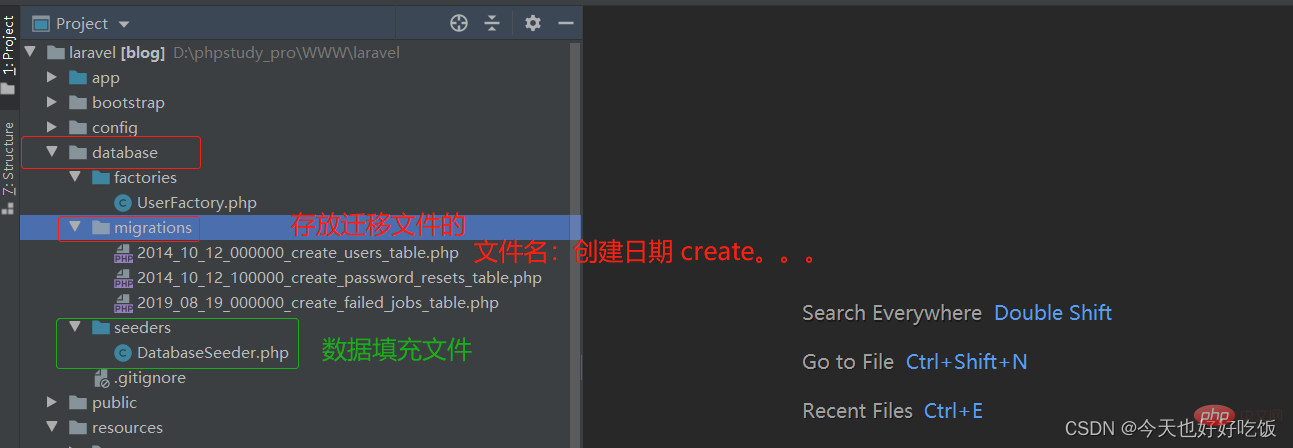
The number at the beginning of the file name is the time
Let’s open it and take a look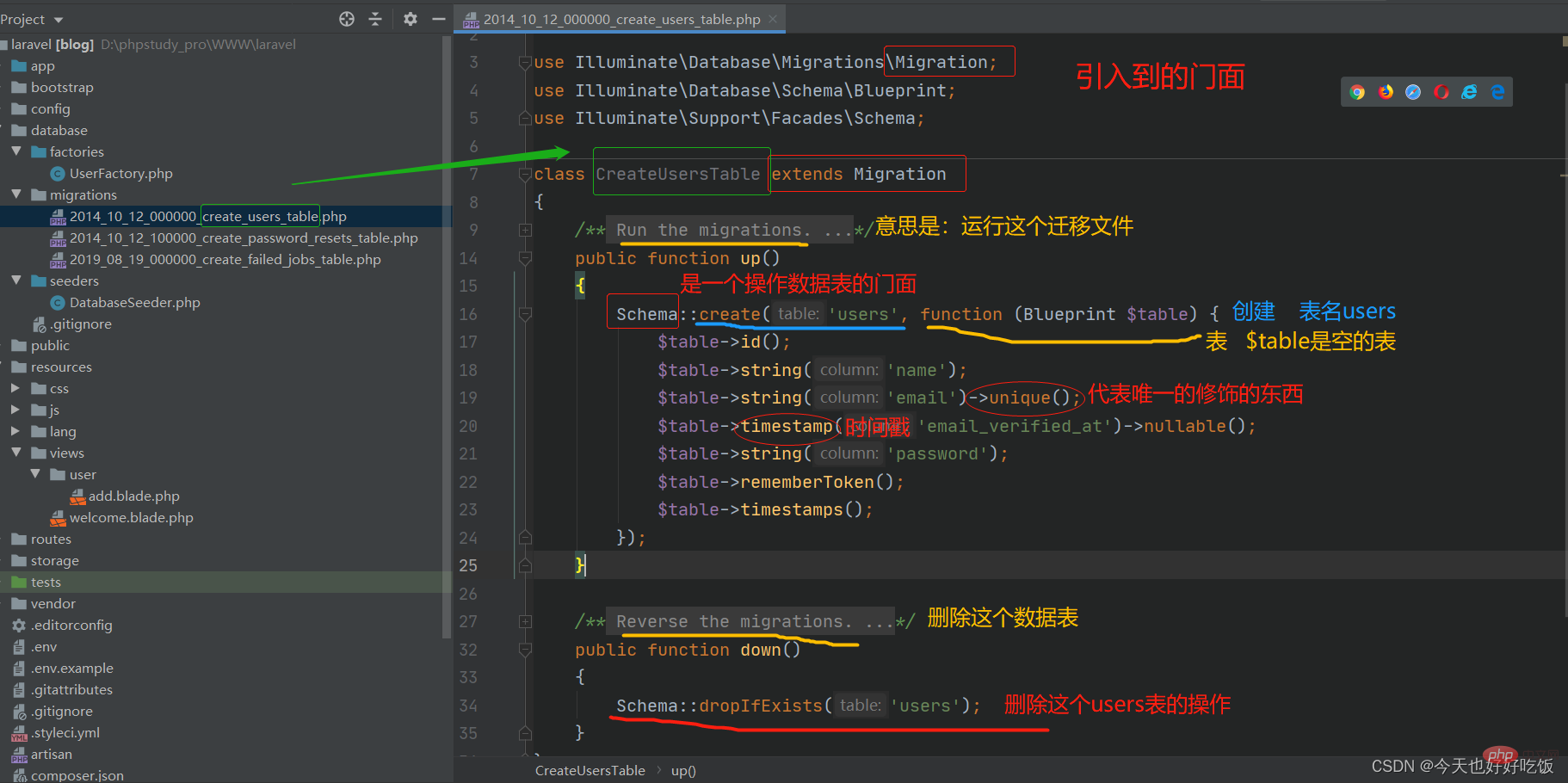
The other two files are also similar, these are laravel 8 Some tables defined by the framework by default. If we executemigration files here, if we don’t need to use these tables (user table, password table, jobs table), best Go to delete it, otherwise we may see the existence of these three tables in the database! ! !
Create migration file
Create a book table book
id primary key
b_name book title
b_pirce book price
b_num book quantity
artisan scaffolding command: We write the name according to the default create_table name_table
php artisan make:migration create_book_table
After creation, the file name will have time in front of it
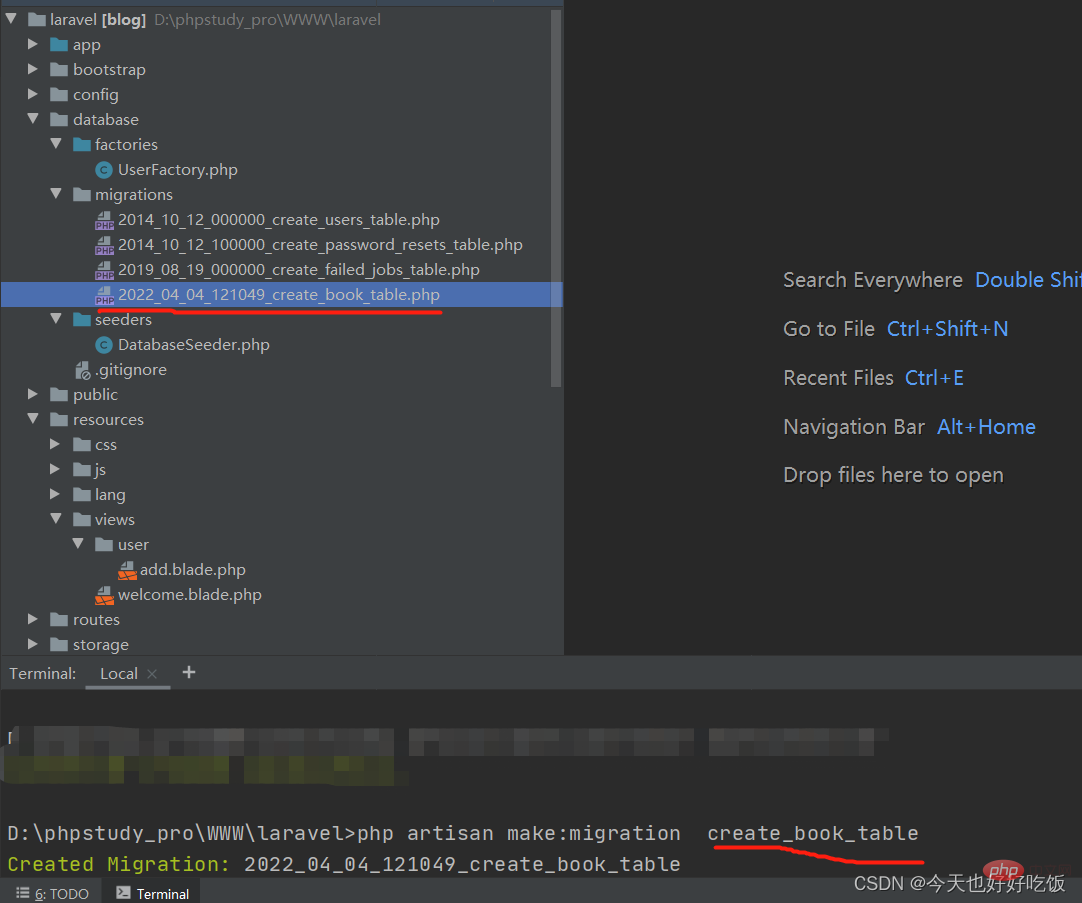
increments('id') method to create an auto-increment id
comment('comment') adds a comment
string('field name', 'length') The created field type is string
integer('field name') The created field type is int
decimal('field name' [, length, precision after the decimal point]) A type specially used to store decimals, default 8,2
$table->charset='utf8mb4'; Define character encoding
<?phpuse Illuminate\Database\Migrations\Migration;use Illuminate\Database\Schema\Blueprint;use Illuminate\Support\Facades\Schema;class CreateBookTable extends Migration{
/**
* Run the migrations.
*
* @return void
*/
public function up()
{
Schema::create('book', function (Blueprint $table) {
$table->increments('id')->comment('主键');
$table->string('b_name','32')->comment('书名');
$table->decimal('b_price')->comment('书的价格');
$table->integer('b_num')->comment('书的数量');
$table->charset='utf8mb4';//定义字符编码
});
}
/**
* Reverse the migrations.
*
* @return void
*/
public function down()
{
Schema::dropIfExists('book');
}}Execute migration file
Before using the migration file, we need to run a command, which is to record every time we The parameters for creating a table are one table at a time, that is, the migrations table, so that when we create the table in the future, we can see which tables were created through the migration file. We need to record such things.
php artisan migrate:install
After we create this table, we can see the number of our migration file run and the name of the executed migration file in the data table.
After running this command, there is an additional table in the database: 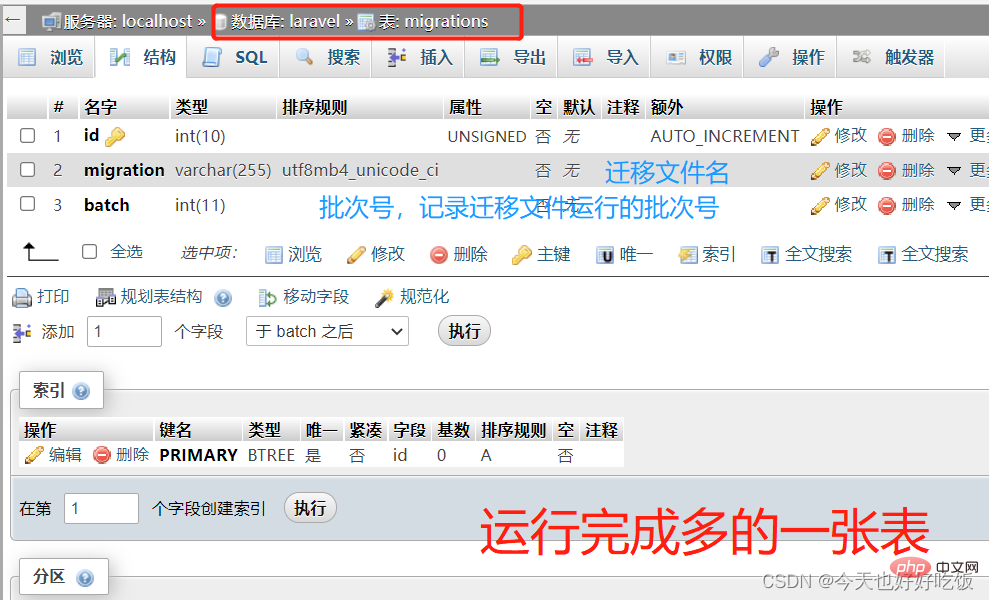
We run the file name we just created to see if it is recorded Go to
php artisan migrate
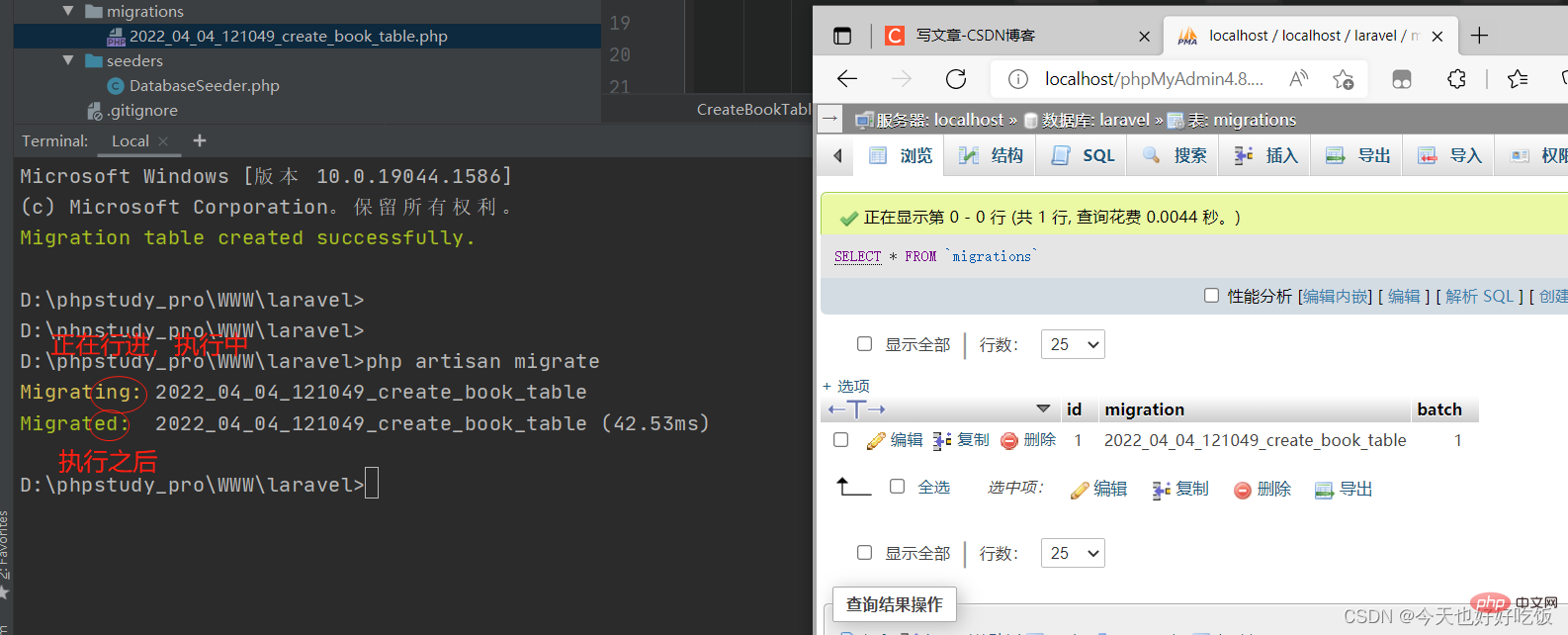
Let’s refresh it again and look at the book table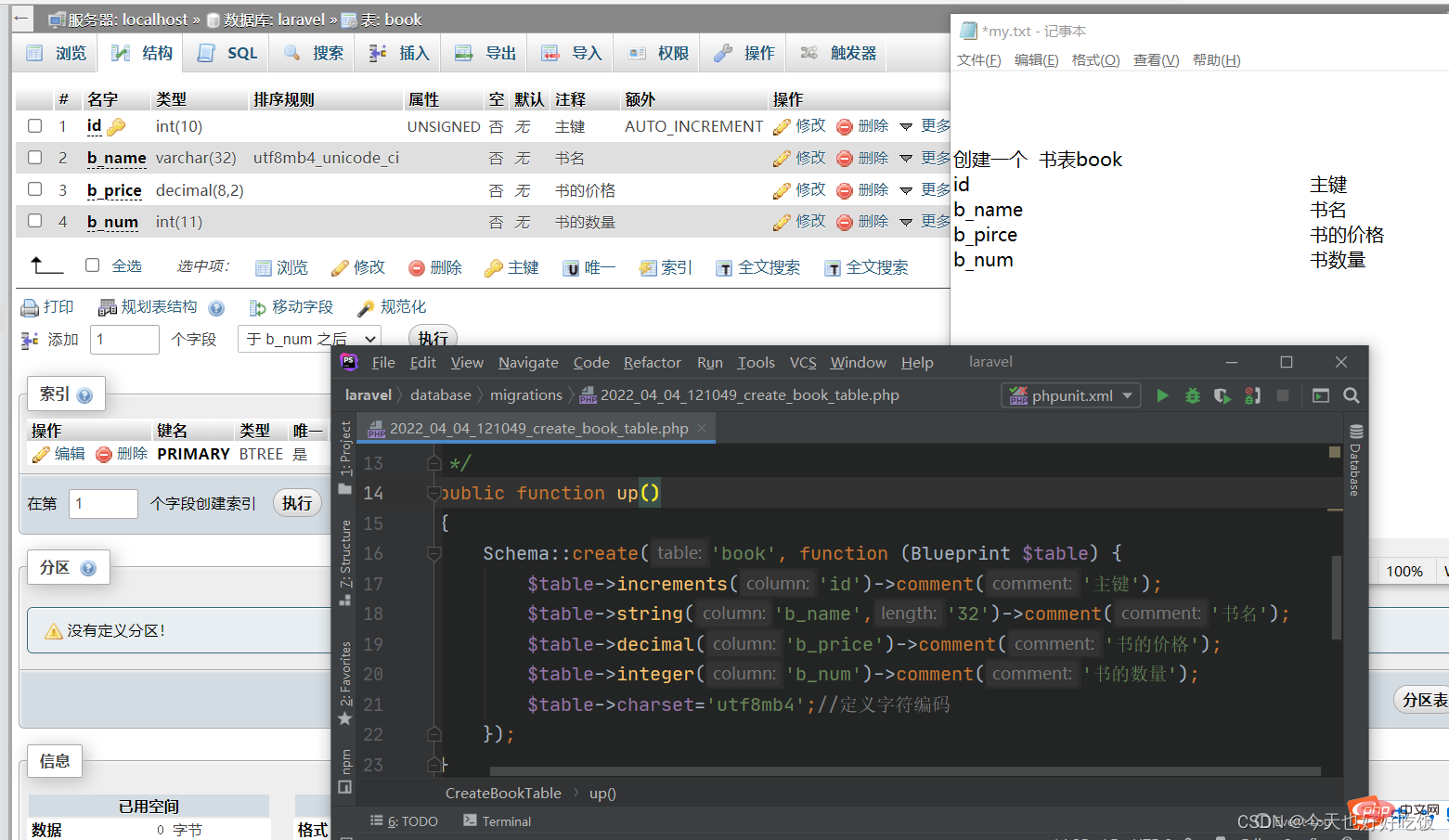
Execute a single migration file: --path=/database/migrations/file Name
>php artisan migrate --path=/database/migrations/2022_04_04_121049_create_book_table.php
Rollback operation/Delete this table
php artisan migrate:rollback
After rollback, the table will no longer exist, the records will be gone and cleared.
Note: Do not change the name of the migration file easily after executing the migration file, otherwise the rollback will not be possible and the name of the previously created migration file cannot be found.
RollbackSpecify the number of migrations : --step=First few files
php artisan migrate:rollback --step=5
[Related recommendations: laravel video tutorial 】
The above is the detailed content of Summarize and organize the knowledge points of laravel 8 migration files. For more information, please follow other related articles on the PHP Chinese website!

Hot AI Tools

Undresser.AI Undress
AI-powered app for creating realistic nude photos

AI Clothes Remover
Online AI tool for removing clothes from photos.

Undress AI Tool
Undress images for free

Clothoff.io
AI clothes remover

AI Hentai Generator
Generate AI Hentai for free.

Hot Article

Hot Tools

Notepad++7.3.1
Easy-to-use and free code editor

SublimeText3 Chinese version
Chinese version, very easy to use

Zend Studio 13.0.1
Powerful PHP integrated development environment

Dreamweaver CS6
Visual web development tools

SublimeText3 Mac version
God-level code editing software (SublimeText3)

Hot Topics
 PHP vs. Flutter: The best choice for mobile development
May 06, 2024 pm 10:45 PM
PHP vs. Flutter: The best choice for mobile development
May 06, 2024 pm 10:45 PM
PHP and Flutter are popular technologies for mobile development. Flutter excels in cross-platform capabilities, performance and user interface, and is suitable for applications that require high performance, cross-platform and customized UI. PHP is suitable for server-side applications with lower performance and not cross-platform.
 How to use object-relational mapping (ORM) in PHP to simplify database operations?
May 07, 2024 am 08:39 AM
How to use object-relational mapping (ORM) in PHP to simplify database operations?
May 07, 2024 am 08:39 AM
Database operations in PHP are simplified using ORM, which maps objects into relational databases. EloquentORM in Laravel allows you to interact with the database using object-oriented syntax. You can use ORM by defining model classes, using Eloquent methods, or building a blog system in practice.
 Analysis of the advantages and disadvantages of PHP unit testing tools
May 06, 2024 pm 10:51 PM
Analysis of the advantages and disadvantages of PHP unit testing tools
May 06, 2024 pm 10:51 PM
PHP unit testing tool analysis: PHPUnit: suitable for large projects, provides comprehensive functionality and is easy to install, but may be verbose and slow. PHPUnitWrapper: suitable for small projects, easy to use, optimized for Lumen/Laravel, but has limited functionality, does not provide code coverage analysis, and has limited community support.
 Laravel - Artisan Commands
Aug 27, 2024 am 10:51 AM
Laravel - Artisan Commands
Aug 27, 2024 am 10:51 AM
Laravel - Artisan Commands - Laravel 5.7 comes with new way of treating and testing new commands. It includes a new feature of testing artisan commands and the demonstration is mentioned below ?
 Comparison of the latest versions of Laravel and CodeIgniter
Jun 05, 2024 pm 05:29 PM
Comparison of the latest versions of Laravel and CodeIgniter
Jun 05, 2024 pm 05:29 PM
The latest versions of Laravel 9 and CodeIgniter 4 provide updated features and improvements. Laravel9 adopts MVC architecture and provides functions such as database migration, authentication and template engine. CodeIgniter4 uses HMVC architecture to provide routing, ORM and caching. In terms of performance, Laravel9's service provider-based design pattern and CodeIgniter4's lightweight framework give it excellent performance. In practical applications, Laravel9 is suitable for complex projects that require flexibility and powerful functions, while CodeIgniter4 is suitable for rapid development and small applications.
 How do the data processing capabilities in Laravel and CodeIgniter compare?
Jun 01, 2024 pm 01:34 PM
How do the data processing capabilities in Laravel and CodeIgniter compare?
Jun 01, 2024 pm 01:34 PM
Compare the data processing capabilities of Laravel and CodeIgniter: ORM: Laravel uses EloquentORM, which provides class-object relational mapping, while CodeIgniter uses ActiveRecord to represent the database model as a subclass of PHP classes. Query builder: Laravel has a flexible chained query API, while CodeIgniter’s query builder is simpler and array-based. Data validation: Laravel provides a Validator class that supports custom validation rules, while CodeIgniter has less built-in validation functions and requires manual coding of custom rules. Practical case: User registration example shows Lar
 PHP code unit testing and integration testing
May 07, 2024 am 08:00 AM
PHP code unit testing and integration testing
May 07, 2024 am 08:00 AM
PHP Unit and Integration Testing Guide Unit Testing: Focus on a single unit of code or function and use PHPUnit to create test case classes for verification. Integration testing: Pay attention to how multiple code units work together, and use PHPUnit's setUp() and tearDown() methods to set up and clean up the test environment. Practical case: Use PHPUnit to perform unit and integration testing in Laravel applications, including creating databases, starting servers, and writing test code.
 Which one is more beginner-friendly, Laravel or CodeIgniter?
Jun 05, 2024 pm 07:50 PM
Which one is more beginner-friendly, Laravel or CodeIgniter?
Jun 05, 2024 pm 07:50 PM
For beginners, CodeIgniter has a gentler learning curve and fewer features, but covers basic needs. Laravel offers a wider feature set but has a slightly steeper learning curve. In terms of performance, both Laravel and CodeIgniter perform well. Laravel has more extensive documentation and active community support, while CodeIgniter is simpler, lightweight, and has strong security features. In the practical case of building a blogging application, Laravel's EloquentORM simplifies data manipulation, while CodeIgniter requires more manual configuration.






